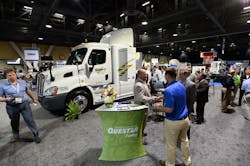LONG BEACH, CA. While some applications, like refuse hauling and port drayage, have already moved to natural gas power for their trucks, long-haul operations, which are responsible for the majority of heavy-truck sales, have not moved much beyond testing and trials. However predictions that long-haul fleets are now about to ramp up adoption of NG were voiced by a number of speakers during the first day of ACT Expo 2014, a conference and show focused on alternative clean transportation. So it was no surprise that a panel promising “a reality check” on HD NG trucks was standing room only.
While 60% of all new refuse trucks sold in the U.S. last year carried NG engines, the long-haul segment is responsible for consuming some 25 billion gals. of fuel annually, according to Andrew Littlefair, president and CEO of NG provider Clean Energy Fuels. “That’s the opportunity [for NG], and I believe the tipping point has arrived,” he said.
One reason has been the successful introduction of a 12L NG engine by Cummins Westport, according to the HD panel. “We’re hearing good reports from the field and the trucks are being very well accepted,” said Charles Cook, vocational marketing manager at Peterbilt Motors.
Kenworth has four truckload carriers that have accumulated almost 3 million mi. on the new 12L NG engine, according to Andy Douglas, national sales manager. Those fleets are seeing a 9% to 11% degradation in fuel consumption and a $0.01 to $0.02/mi. increase in maintenance costs, he said, but that doesn’t take into account any longer term savings that may accrue from not having to maintain diesel after-treatment systems or the consumption of diesel emissions fluid (DEF).
Some fleets did experience performance problems with the new engines related to cold weather, “but hats off to Cummins Westport for going out and making that right,” said Frank Bio, director of sales development for alternative fuels at Volvo Trucks.
And as fleets accumulate more real-world data and experience with NG trucks in different applications, their comfort level with the new technology is increasing, according to Roy Horton, powertrain marketing manager at Mack Trucks. And with more volume will come lower prices, further increasing market penetration, he pointed out.
Asked if earlier forecasts that NG would account for 10% of HD truck sales by 2020 were too low, Douglas said that timeframe might be too conservative. “I think we could hit 10% in two to three years,” he said. Citing the rapid expansion of the natural gas fueling infrastructure over the last year, Cook echoed that optimism, pointing out that “with CNG stations expanding, it’s turning up the volume and I could see us ramping sales up to 20% [by 2020].”
For long-haul fleets, fueling will be the one key factor going forward, according to Bob Carrick, natural gas sales manager for Freightliner Truck. “They need [NG] fueling everywhere they want to go,” he said. Refuse and regional fleets that have had success with NG “almost all have their own fueling stations, but long-haul fleets don’t want to turn down loads, so they’ll wait until there’s a true regional network.”
As for choosing compressed natural gas (CNG) over liquified natural gas (LNG), the panel’s consensus was that the broader availability of CNG fueling locations argues in favor of CNG for the immediate future, but that LNG would gain share as more fueling options are developed. Fleets will have to do some homework on their particular range and chassis packaging requirements, said Horton. Given LNG’s advantages for longer haul applications, he predicted that the CNG/LNG mix would grow from 90/10 today to 50/50 by 2020, and the other panelists generally agreed.
Closing out the session, the panelists were asked to name the one thing they would change that might accelerate a transition to NG for heavy trucks.
For Cook, it was better training for service techs, drivers and the person spec’ing the trucks. “Our next big hurdle is educating the industry and dealers and technicians,” said.
Education not only for customers, but also for aftermarket support providers and the people responsible for building the trucks on the assembly lines was Horton’s suggestion. And Bio added “we also need to educate those outside the industry.”
More NG engine choices like the planned 6.7L and 15L under development by Cummins was on Douglas’s wish list, as was greater appreciation by shippers of the cost and sustainability benefits they could reap from carriers moving to NG.
And finally, Carrick agreed with them all, adding that the only other thing he might like to see is some small legislative relief such as waivers in federal excise and sales tax for NG equipment, as well as some relaxation of weight and length restrictions that could offset the addition of NG fuel systems and tanks.
About the Author
Jim Mele
Jim Mele is a former longtime editor-in-chief of FleetOwner. He joined the magazine in 1986 and served as chief editor from 1999 to 2017.
